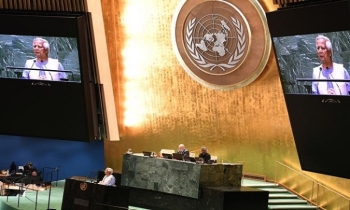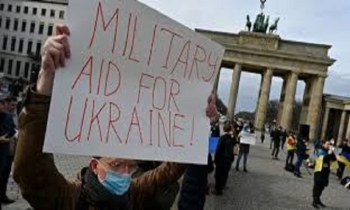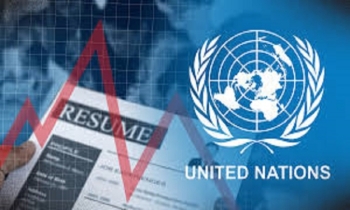Here come more sanctions: How effective are they are stopping Russia’s invasion of Ukraine?
AP/UNB || BusinessInsider

Photo: Collected
The US and other Group of Seven nations rolled out a new wave of global sanctions against Russia over its invasion of Ukraine as they met Friday during a summit in Japan.
The sanctions target hundreds of people and firms — including those helping Russia to evade existing sanctions and export controls. Some of the sanctions focus on additional sectors of Russia's economy, including architecture, construction and transportation.
After 15 months of war, the allied nations are still aiming at new targets for financial penalties that block, freeze and seize access to international funds.
Treasury Secretary Janet Yellen said the newest sanctions will tighten the grip on Russian President Vladimir Putin's "ability to wage his barbaric invasion and will advance our global efforts to cut off Russian attempts to evade sanctions."
But there are limits to how much impact they can have.
A look at the sanctions dynamics:
WHAT'S IN THE NEWEST ROUND?
The U.K imposed sanctions on 86 people and companies, including parties connected to the theft and resale of Ukrainian grain. It also banned the import of diamonds from Russia. The European Union, too, plans to restrict trade in Russian diamonds.
The US hit individuals and organizations across 20 countries, focusing on people and firms helping the Kremlin evade existing sanctions to procure technology. The Commerce Department added 71 firms to its list, and the State Department put 200 people, firms and vessels on its blocked list.
Additionally, new US reporting requirements were issued for people and firms that have any interest in Russian Central Bank assets. The purpose is to "fully map holdings of Russia's sovereign assets that will remain immobilized in G7 jurisdictions until Russia pays for the damage it has caused to Ukraine," the Treasury Department said.
HOW EFFECTIVE HAVE THE SANCTIONS BEEN SO FAR?
While the US and other G7 nations have turned Russia into the most sanctioned country in the world, some foreign policy experts question the effectiveness of the financial penalties and point to Russia's maneuvers to evade them and press its war effort.
Maria Snegovaya, a senior fellow at the Center for Strategic and International Studies, said Russia has demonstrated "a remarkable degree of adaptability to Western sanctions."
She added that the war is "relatively cheap" for Russia to prosecute, amounting to up to an estimated 5 percent of GDP.
"That is easily manageable for Russia in the next couple of years at least, and the cumulative effect of sanctions is just not strong enough to radically alter that," she said.
US officials defend the effectiveness of the sanctions, and argue that they are not designed to work immediately.
Along with imposing individual sanctions, the US and allies have frozen Russian Central Bank funds, restricted Russian banks' access to SWIFT — the dominant system for global financial transactions — and imposed a $60-per-barrel price cap on Russian oil and diesel.
The Treasury Department on Friday in a new progress report said the price cap has been successful in suppressing Russian oil revenues. It cited Russian Ministry of Finance data showing that the Kremlin's oil revenues from January to March of this year were more than 40% lower than in the same period last year.
"Despite widespread initial market skepticism around the price cap, market participants and geopolitical analysts have now acknowledged that the price cap is accomplishing both of its goals," the Treasury Department report.
WHY ARE THE US AND ITS ALLIES STILL FINDING NEW TARGETS?
Treasury officials say that as sanctions are imposed, Russian intelligence keeps looking for ways to get around them, requiring constant adjustments.
Newer sanction efforts have been dedicated to the evaders and the "facilitators" of evasion, who help Russia acquire supplies and technology.
"We know the Kremlin is actively seeking ways to circumvent these sanctions," Treasury Deputy Secretary Wally Adeyemo said earlier this year.
"One of the ways we know our sanctions are working is the Kremlin has tasked its intelligence services, such as the FSB and GRU, to find ways to get around them."
Among other things, US officials say, Moscow has turned to North Korea and Iran to resupply the Russian military with drones and surface-to-surface missiles.
WHAT MORE IS THERE TO SANCTION?
Treasury officials say future targets could include newly identified firms and people connected to supply chains that help Russia gain materials for the war, front companies that help Russia evade sanctions and rogue actors from North Korea and Iran.
For the past month, Treasury officials Brian Nelson and Liz Rosenberg have traveled across Europe and Central Asia to press countries that do business with the Kremlin to cut off financial ties because of the war on Ukraine.
They are also increasingly sharing intelligence between countries and firms to spot evasion.
There are also calls for the US and allies to confiscate and transfer Russia's central bank funds to Ukraine for the war effort.
"The G7 countries must sustain and augment their efforts, including by confiscating frozen reserves of the Central Bank of Russia to help fund Ukraine's reconstruction," said Jeffrey J. Schott, a senior fellow at the Peterson Institute for International Economics.
























